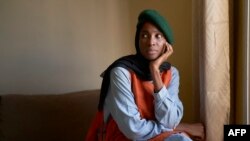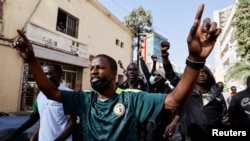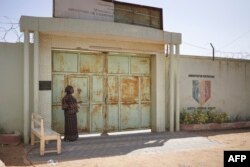Ndeye Fatou Fall picked up her phone and logged into Facebook to follow the latest developments in the crisis rocking Senegal, triggered by President Macky Sall's postponement of the presidential election.
"The arrests are starting again. They're arresting everyone. In this case, it's MP Abass Fall who's just been arrested," said the activist, better known as Falla Fleur, as she pointed to a page linked to the dissolved opposition party of firebrand Ousmane Sonko.
Several hundred opposition members, or over a thousand according to some rights organisations, have been arrested in Senegal since 2021 amid the power struggle between Sonko and President Sall.
Sonko was arrested in July last year and his bid to run in the presidential race was later rejected.
His replacement candidate, Bassirou Diomaye Faye, has also been in prison since 2023 after he published a message on Facebook critical of the justice system.
Authorities routinely ban demonstrations organised by the country's opposition.
All the rallies to protest the delay to the presidential poll were stifled before they even began.
Determination to fight
"Now, everyone realises that Macky Sall is a dictator," said Fleur, sporting a green beret and a scar under her right eye -- the vestige of a shrapnel wound received during a protest in 2021.
With more than 76,000 followers on Facebook, she is one of the leading figures fighting for the departure of the president, whose term in office has just been extended by parliament until the end of 2024.
Fleur was arrested and detained for her social media activity just before the deadly unrest that followed Sonko's conviction last year.
She was released in November -- losing her job but not her spirit.
"No one can intimidate me. If that's the price I have to pay, I'm ready to go back to prison," she said, convinced that her compatriots would not allow what she called a "coup" by President Sall.
While activists were buoyed by a determination to fight, news of the vote delay filled detainees and their families with despair.
"What comforted the prisoners was that the elections were coming up. What am I going to tell them now?" asked Papis Djim, 28, a member of a prisoners' families group.
His brother has been detained for over a year.
"All the victims' families were pinning their hopes on the elections," Djim said.
"This postponement is synonymous with prolonged detention for political prisoners."
Djim helps prisoners by bringing them food and putting them in touch with lawyers.
He explained that all the detainees wanted a trial.
"Some of them don't even know what they're accused of," he added.
Crackdown
The prosecution and courts "systematically deny bail... to political opponents and keep them in prolonged pretrial detention, in violation of international human rights law," Human Rights Watch said in a January report.
Charges most commonly brought against the opposition include alleged acts likely to compromise state security, calls for insurrection, dissemination of fake news, conspiracy to commit terrorist acts, and defamation.
The government says it is cracking down on those causing instability, and denies the existence of political prisoners.
"Senegal is a country of rights, a country of freedoms, where all freedoms are exercised without hindrance," Justice Minister Aissata Tall Sall told the UN Human Rights Council in Geneva in January, while affirming the independence of the courts.
But this is not a view shared by 50-year-old Rokhaya Ndiaye, who every Tuesday and Thursday visits her imprisoned son in Dakar.
Pape Abdoulaye Toure was the leader of a student protest movement before being expelled from university and arrested last year.
Amnesty International's director in Senegal, Seydi Gassama, told AFP that Toure had been severely mistreated by security forces and suffered several broken bones.
He said the case had been referred to the UN.
"This way of doing politics is new in Senegal," Toure's mother said while emotionally recounting his ordeal, adding her dearest wish was just to see her son regain his freedom.














Forum